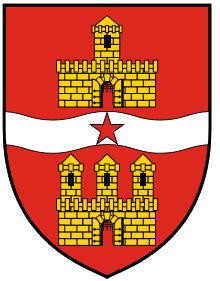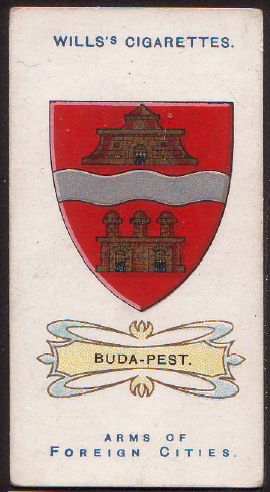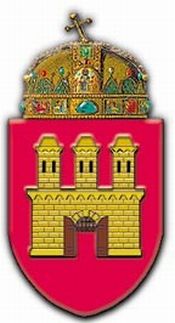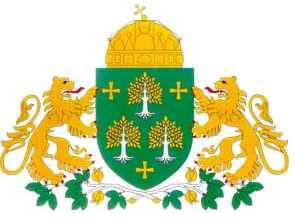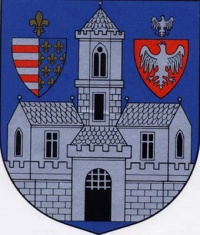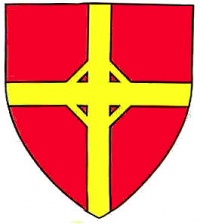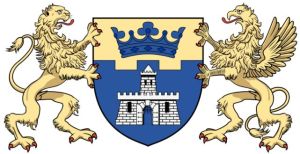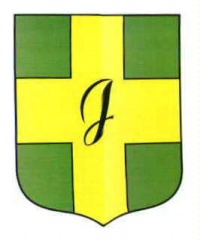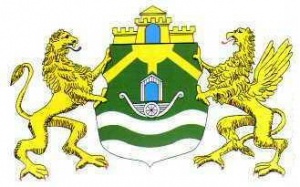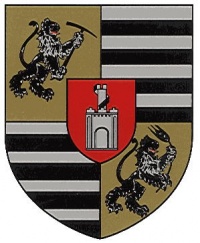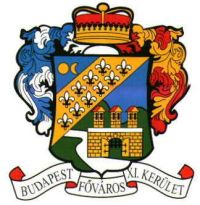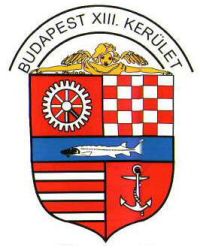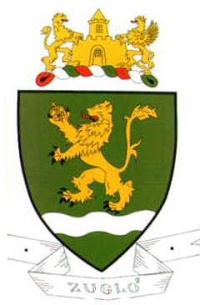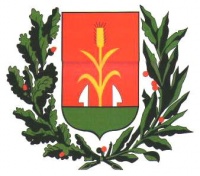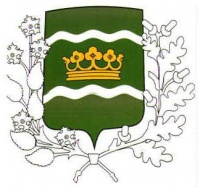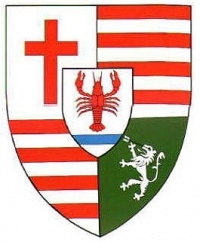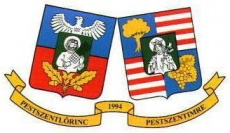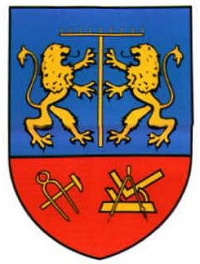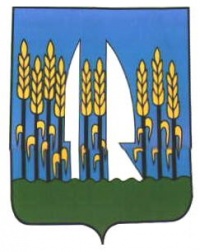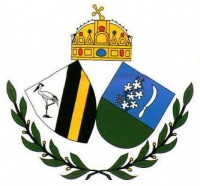Budapest
| Heraldry of the World Civic heraldry of Hungary |
BUDAPEST
Province (county) : Budapest
Official blazon
Origin/meaning
In the year 1873, the city of Budapest was founded. It is an association of the old cities of Buda and Ó-buda (Old-Buda) on the western hills on the banks of the river Danube and the newer city Pest on the eastern banks. The old city of Buda was founded in the 13th century when King Bèla IV. built the fortress after the battle against the Tartars.
The upper part of the arms shows the old Pest arms with one tower, on the lower is the old Buda arms with three towers. The second gate on the wall of Buda represents Ó-Buda, which had totally different arms before.
The bar symbolises the river Danube.
The arms are crowned by the holy crown of St. Stephan. Stephan was the first King of Hungary, and the crown was given to him by Pope Sylvester II. The holy crown is the symbol of the State of Hungaria and the sanctuary of the Hungarian people. St. Stephan died in 1038.
During communist rule, a red star was placed on the silver bar, see below.
| The arms from 1964-1990 |
The arms on collector's items
| The arms on a stamp from the 1930s |
The arms on a British tobacco card, 1910s |
| The arms from 1964-1990 |
Districts of Budapest
Budapest is divided into 23 districts, all of these use arms.
| Budapest I : BUDAVÁR I have no information on the meaning or origin of these arms. Any information is welcome ! |
|
| Budapest II : PESTHIDEGKÚT I have no information on the meaning or origin of these arms. Any information is welcome ! |
|
| Budapest III : ÓBUDA-BÉKASMEGYER The arms were granted on June 13, 1991. The district is the union of the formerly Óbuda town (in 1873 united with Buda and Pest cities to Budapest) and the German inhabited Békasmegyer (Krottendorf) village (united in 1950). The first known seal was used between 1370-1380, under the ruling of King Louis The Great. It had been readapted several times until the Turkish occupation, but that design was forgotten later. |
|
| Budapest IV : ÚJPEST I have no information on the meaning or origin of these arms. Any information is welcome ! |
|
| Budapest V : BELVÁROS - LIPOTVÁROS I have no information on the meaning or origin of these arms. Any information is welcome ! |
|
| Budapest VI : TERÉZVÁROS I have no information on the meaning or origin of these arms. Any information is welcome ! |
|
| Budapest VII : ERZSÉBETVÁROS I have no information on the meaning or origin of these arms. Any information is welcome ! |
|
| Budapest VIII : JÓZSEFVÁROS I have no information on the meaning or origin of these arms. Any information is welcome ! |
|
| Budapest IX : FERENCVÁROS I have no information on the meaning or origin of these arms. Any information is welcome ! |
|
| Budapest X : KÖBÁNYA I have no information on the meaning or origin of these arms. Any information is welcome ! |
|
| Budapest XI : LÁGYMÁNYOS I have no information on the meaning or origin of these arms. Any information is welcome ! |
|
| Budapest XII : HEGYVIDÉK I have no information on the meaning or origin of these arms. Any information is welcome ! |
|
| Budapest XIII : ÚLJIPÓTVAROS I have no information on the meaning or origin of these arms. Any information is welcome ! |
|
| Budapest XIV : ZUGLÓ I have no information on the meaning or origin of these arms. Any information is welcome ! |
|
| Budapest XV : RÁKOSPALOTA - PESTÚJHELY I have no information on the meaning or origin of these arms. Any information is welcome ! |
|
| Budapest XVI : CINKOTA I have no information on the meaning or origin of these arms. Any information is welcome ! |
|
| Budapest XVII : RÁKOSCSABA I have no information on the meaning or origin of these arms. Any information is welcome ! |
|
| Budapest XVIII : PESTSZENTLÓRINC - PESTSZENTIMBRE I have no information on the meaning or origin of these arms. Any information is welcome ! |
|
| Budapest XIX : KISPEST I have no information on the meaning or origin of these arms. Any information is welcome ! |
|
| Budapest XX : PESTERZSÉBET I have no information on the meaning or origin of these arms. Any information is welcome ! |
|
| Budapest XXI : CSEPEL I have no information on the meaning or origin of these arms. Any information is welcome ! |
|
| Budapest XXII : BUDAFOK - TÉTÉNY I have no information on the meaning or origin of these arms. Any information is welcome ! |
|
| Budapest XXIII : SOROKSÁR I have no information on the meaning or origin of these arms. Any information is welcome ! |


